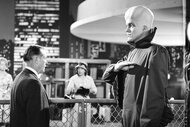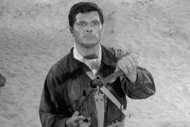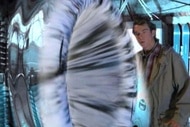Create a free profile to get unlimited access to exclusive videos, sweepstakes, and more!
Animator Eric Stine sees Black and brown faces as 'The Future of Sci-Fi' in SYFY short
In honor of Black History Month 2021, SYFY and Tongal, a global community of content creators, invited six Black animators and filmmakers to create video shorts that represent their experiences through the lens of science fiction and fantasy.
Starting Feb. 1, these six shorts will premiere on the SYFY network and be posted on SYFY's Instagram and Twitter handles throughout the month — and beyond. To further celebrate these original shorts, SYFY WIRE got in touch with the creators in order to break down their work and take a closer look at what inspires them. Next up is Eric Stine, creator of "The Future of Sci-Fi," a celebration of classic genre personas with Black faces at the forefront — and for Stine, some familiar ones!
Tell us about yourself!
I was born and raised in Fort Wayne, Indiana and I currently live in Brooklyn, New York. I was born in the late '70s, so I was an '80s kid! Grew up with Transformers and He-Man, Go-Bots, and Star Wars (o.g.).
I am a visual artist and I've also dabbled in music production and film. My visual art experience spans so many different areas of making — from digital to screen-printing, to collage, woodworking, animation, painting, and book-making.
I've worked as a designer and art director for the last 20 years at a few agencies. I currently work as an independent contractor for a team within YouTube.
Tell us about your piece. What inspired you and what does it mean to you?
With this piece, I wanted to attempt something where I could implement the wacky, somewhat janky collage technique that I love so much — but in a way that wouldn't feel overwhelming — to produce a 30-second animation. From my own experience of being a fan of so many different genres within the sci-fi world, I came up with the idea of various "sci-fi personas" all existing inside of me, melding together to represent my very personal sci-fi fandom. It seemed like a fun visual to put together and could allow for a wide spectrum of characters through which I could represent Black and brown faces.
What about this piece makes it a reflection of yourself and your love of genre?
Well obviously first I put my own big face in the animation, so it's cool and weird to see me animated with the rest of the characters! But with doing that there's also a process of letting go of the personal self-consciousness and letting the art have a life outside of yourself.
Through the various scenes and characters in the piece, I did want to represent my desire for better representation of the members of our human family; 40, 50 years later, we're still struggling to get Black people seen as viable lead characters for mainstream storytelling. So in my short 30 seconds, I tried to represent a varied spectrum of the types of characters and faces that need more shine.
What and/or who inspired you to become an artist?
I would say that my grandmother had a big influence on my love of art. One of my earliest art memories is going with her to the art supply store, which at that time was a big cavernous warehouse, and I remember instantly falling in love with everything about it: the kooky space, the expanse of colored paper and brushes and paints and all the untold possibilities that they could unleash. I remember that time with her as a pivotal experience in my early art mind.
My grandmother was a really great artist, and in her early adulthood, she worked as an illustrator for one of the major department stores in town, illustrating advertisements and displays. She had to give up her career when they started a family, which has always really made me sad to know what she had to give up, and the unfairness of a woman needing to make the choice of "only family" or "only career."
Secondly, I had an art teacher during middle school who really went the extra mile to help me feel comfortable with the act of making: Mrs. Holbrook. She bought me art supplies when our family was really struggling financially and my mom didn't have the means to buy me extras like art supplies. I still have the Art Bin that she bought for me those 30 years ago. I cherish it. Having someone who isn't your family step up and say "Hey, I see potential in you and I want to help you because I believe in you" was so monumentally huge in establishing a path that opened up a whole world of life possibilities for me. It was a small gesture, but I'm eternally grateful for her generosity.
What do you love about genre? Tell us about some of your favorite works and why you love them.
The original Star Trek series looms super large in my mind. That series was by far my biggest introduction to sci-fi and my love for all things space-related. Back in the early '80s, the old episodes would run daily, sometime in the afternoon, and I remember watching so many of them. I remember being scared a few times of specific alien costume designs. It's funny to think back on now. I loved that show so much. It was wildly innovative in my little mind at the time. I loved and still love Spock. He's such a class act. Gifted with logic, tormented by his human emotions... he's always felt so relatable. Distant and unique, but still a part of the family. A crucial part of the family.
Back in elementary school, I wrote numerous letters to Spock, addressed to our local television station that broadcasted the show — my thinking that, of course, Spock worked at the TV station in my town. Because what else was there? I had no knowledge of Hollywood or even that there were other cities outside of my own. I just wanted to talk to Spock! The station was nice enough to write back and kindly inform me that Spock wasn't working there.
I love the Back to the Future series. It's so damn corny but it's so good! Marty and Doc do all that stuff in like a day! The actual concept of time and space was so illogical and bad, but I get giddy thinking about Old Biff, Car Wash Biff, Young Biff, and Rich Biff, Marty and his mom, the Hoverboard. Man! In my mind, Thomas F. Wilson's performance as all the Biff characters in those three films is at some sort of pinnacle of artistic greatness.
I also think, as a young man who didn't have his father in the picture, I probably gravitate to the storyline of Marty the kid having a cool, engaged elder man figure in his life who wants to spend time with him and have adventures together. I think even now that dynamic of the two men still pulls me in — a son and a father figure, caring for each other, sharing interests and time, and not abandoning each other when things get hard.
I really hope the powers that be don't ever mess with that franchise.
One more I have to mention is Akira. I just want Akira to get more damn respect. This is one of the greatest science fiction stories ever created. Ever. The manga book is so deep and so stunning it deserves a whole other discussion. But the film that was created in parallel with the manga is equally if not more stunning in its production. Breathtaking visuals created at a frame rate and immaculate hand-drawn technique that no studio in Hollywood had ever or will ever attempt. The story and the images scared me and seduced me. I didn't discover it until my early 20s, but the young artist in me would just hit the pause button on any frame at any moment and be in awe of the visual production of a single frame.
Katsuhiro Otomo, the creator/artist/writer/director/genius behind Akira created a true work of art that conceptually stands equal to anything George Lucas or Steven Spielberg or the like has ever thought of and artistically surpasses them all.
See it if you haven't. If you have, watch it again.
When was the first time you remember seeing Black representation in the fantasy/sci-fi/genre space? Was it a show? A specific creator?
My first memory would have to be Lieutenant Uhura from the original Star Trek series. Seeing Uhura, a young Black woman, on the deck with the white men higher-ups (Captain Kirk and Spock and McCoy, etc.) was really cool, and I hope my little mind even back then could register that it was something different, or not "normal." Uhura was strong and confident in that environment, and that was a huge deal. I applaud Gene Roddenberry and the Original Series for taking some of the chances they did in their era to attempt to depict a better society in which our commonalities outweigh our differences.
(Also shout out to Sulu!)
Lando from Star Wars was also in the mix early because of the time frame, but Uhura was it. I do remember being pretty jazzed as a six-year-old that someone who looked like me was hanging with Han.
On the flip side: What still needs to happen to make you feel as though Black experiences and stories are truly represented in genre?
There is so much! Lord, where to start... haha.
One major effort needed is to continue to get more Black writers and directors to a place of equal access to the production mechanisms that move Hollywood. Change has to start from the top, where Black decision-makers are given the keys and allowed to make the active top-down choice to include Black vision and Black thought and Black experience in their roadmap and be empowered to own up to the responsibility of engaging in the tough conversations and defending those choices against the white power structure as pushback arises. So many times the power structure falls back on tokenism, where even if there is Black talent moved into a leadership capacity, many times they aren't given the proper leeway and support to pursue things that are outside the expected and safe "white-centric norms."
This entire white-centric thinking as being the barometer of "normal" needs to be broken down, dismantled, and lit on fire.
Black people are weird... Black people are nerdy... Black people love science… Black people want to go to space. None of that is abnormal.
As I mentioned Star Wars and Lando above — how impactful would it have been for millions of kids growing into themselves if the Black guy wasn't the sidekick, but he was the lead? If he was getting the credit for saving the universe and scoring the princess. And Han (the white guy) was his limited screen time sidekick? That seems unimaginable.
What does Black History Month mean to you?
I have mixed feelings about it. To me, it's a glaring example of white America's consistent deniability of actual American history and truly honoring the good and the bad that makes us what we are as a community. America likes to roll things up in nicely digestible packages for easy consumerism... Black History Month is one of those things. We absolutely need to focus on historic reflection and current critical issues. We need the stories of family and heroes that are shared during this month, we need the extra focus on parts of American and world history that don't normally get the proper attention and proper respect; but to relegate that to 28 days of the shortest, s***iest month of the year is suspect at the least.
We need this same focus and attention 365 days of the year. Black people's history is American history, not some offshoot side genre of B-level American history.
I truly appreciate SYFY giving us this platform to share our work and our voice. It's been a really cool honor. Now let's not wait until next February to do it again!
Watch "The Future of Sci-Fi" below and find more of Eric Stines' work on Instagram and Twitter. Check out it and other creators' shorts on the SYFY network and on our YouTube as they premiere throughout Black History Month.



























